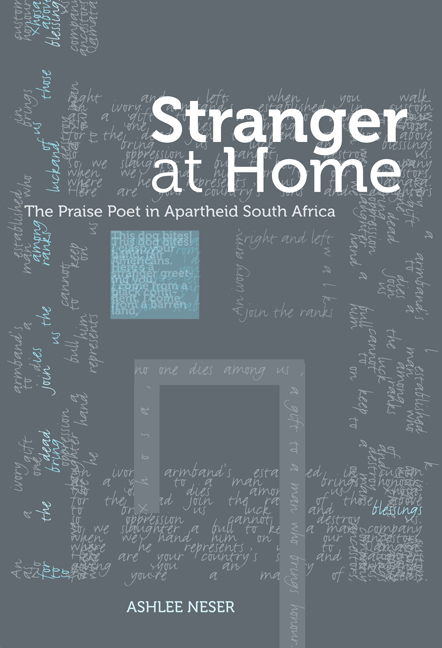
- Publisher:
- Wits University Press
- Online publication date:
- May 2019
- Print publication year:
- 2011
- Online ISBN:
- 9781868145546
Last updated 10th July 2024: Online ordering is currently unavailable due to technical issues. We apologise for any delays responding to customers while we resolve this. For further updates please visit our website https://www.cambridge.org/news-and-insights/technical-incident


The praise poet (imbongi) is a familiar cultural icon in contemporary South Africa. Public events as diverse as presidential inaugurations, openings of parliament, fashion shows and boxing contests begin with the rousing declamations of charismatic iimbongi. Yet until the institution of majority-rule, praise poets who sought to shock their audiences with dangerous truths could claim none of the prestige enjoyed by their present-day counterparts. Under apartheid, many praise poets either ceased to perform or abandoned the imbongi's duty to diagnose and criticize political and social ills. There was, however, one brilliant Xhosa imbongi called David Manisi, a poet widely acclaimed in his youth as the successor to the great SEK Mqhayi, who refused to capitulate to the ease of silence or complicity. As documented by Jeff Opland in The Dassie and the Hunter (UKZN Press), Manisi worked tirelessly and in embattled contexts to address his audiences with demands, criticisms and aspirations they frequently misunderstood.This book is about the poetry, vision and deeply inhospitable context of one of South Africa's most talented praise poets. The author of five volumes of Xhosa poetry and performer of inspired and elegantly crafted izibongo (praise poems), Manisi saw himself as a man of multiple places, allegiances and identities at a time when these markers of self were rigidly policed. Manisi's entrance on the local Transkeian poetry scene was legendary. He was for a time the most famous poet in Kaiser Mathanzima's court. He also wrote the first published poem about Nelson Mandela in 1954, hailing him prophetically as “Gleaming Road”. Despite these early accomplishments, Manisi ended his career as a lonely performer in American and South African universities. He never met Mandela, his hero of old.Ashlee Neser examines Manisi as an inventive negotiator of rural and urban spaces, modernity and tradition, performance and publication, the local and the foreign. She treats him as a representative of a complex of beliefs and identities that was neither accommodated by apartheid politics nor adequately recognized and theorized by the extensive literature on South African identity and culture. In the divided context in which he created poetry, the author argues, it was not possible for Manisi to articulate the package of identities that defined him. The over-determined public discourse, caught in meanings dictated by apartheid politics and the urban-centred resistance movement, distorted and isolated Manisi's poetry.As a book about an important and neglected literary figure, Stranger at Home will appeal to scholars in literary studies, especially in the areas of orality and folklore. The book's broad historical and political focus makes it useful to Africanists and cultural historians, while anthropologists and ethnographers will be interested in its concern with cultural translation and the interweaving of the urban and the rural, of tradition and modernity.
 Loading metrics...
Loading metrics...
* Views captured on Cambridge Core between #date#. This data will be updated every 24 hours.
Usage data cannot currently be displayed.